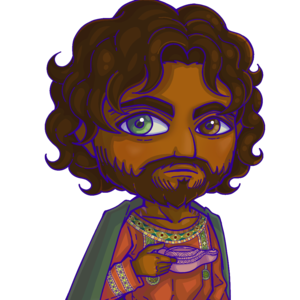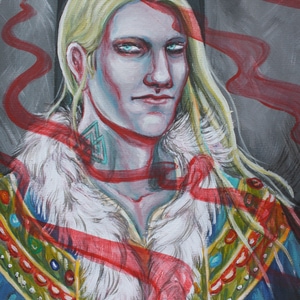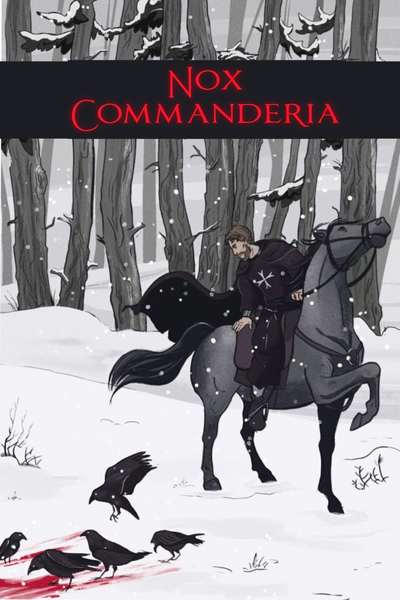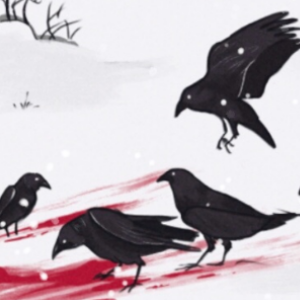On a windy afternoon in the middle of September a group of riders passed a clump of oaken trees by the road to Vezeley. Strong wind tore at their black habits and cloaks, giving them a look of grim, oversized crows. Snow, which had only fallen the night before, lay on the ground, fresh and white, and reflecting the occasional rays of sun. The riders were Knights of the Hospital of St. John, or as they were usually known, Hospitallers. A knightly order dedicated to helping pilgrims and the poor. And to fighting the infidel. Not that there were any infidels here in central France. But still.
Above the road actual, real crows, black and loud, could be heard calling out to each other excitedly they flocked around a pile of something lying by the side of the road. That something was five, fresh corpses. By the look of it, the people had been pilgrims. Their hats, cheap, undyed clothing, and pilgrim staffs said as much. The bodies lay strewn around the road, blood already soaked into the snow, colouring it red. Someone had hewn them down brutally without even bothering to hide the bodies.
The crows pecked at the bodies. Disliking the sight, of the Hospitallers trotted up, scaring the birds into flight. They rose into the air like a dark cloud but did not fly away. This was food to them, like any other, and they would wait until the humans left and let them enjoy their meal in peace.
Another of the knights, a skinny, short fellow whose black habit was too big for him, jumped off his horse and knelt by one of the bodies. He studied the wounds of the dead, then the ground around them.
“They were killed today morning,” he said thoughtfully, “there’s a lot of hoofmarks around them, see? Three attackers, I think.”
The leader of the group, Brother Humphrey, looked grimly at the bloody sight, his eyes shadowed. He was man in his mid-twenties, with slightly curled, reddish-blond hair and a close-cropped beard. He was lean, thin even, with hard, wiry muscles. His somewhat bony frame was mostly hidden by the loose Hospitaller habit, thought you could still see the curve of sharp elbows under the voluminous sleeves.
Humphrey sighed and patted the neck of his roan palfrey, Dragonfly. The smell of the bodies and of the blood made the horse nervous. She danced a little and snorted loudly. Humphrey cooed to her absentmindedly then rode closer to the bodies.
“They haven’t been robbed!” he exclaimed.
The skinny tracker nodded his head.
“Exactly. Money, food, spare clothes, it’s all here in their bags. Whoever killed them, didn’t bother to take the spoils. Strange as that may be.”
“Can you follow the tracks of the attackers?” Humphrey asked, frowning.
“In this snow? Easily! Unless it starts snowing again.”
“Good! Brother Lawrence!” Humphrey turned to a young sergeant. The teen raised his head and looked at Humphrey questioningly, “I want you to ride back to the city and come back with a wagon to take the bodies for burial. The rest of you, we ride after the murderers! Brother Felix, you are the best tracker, so you are in the lead!”
They rode off, leaving the crows to swoop down to finish their meal.
***
They followed the tracks until dusk. This got gradually more and more difficult as the snow began to fall again. It covered the tracks and Brother Felix had to jump off his horse and look for them carefully quite often, slowing down their progress. Humphrey wished they had a scent hound with them. Hounds would not lose the track because of a bit of snow. But Knights of the Order of the Hospital of St. John did not keep such dogs. Hunting with dogs was a sign of luxury. And the Hospitallers were to keep away from luxury. At least in theory. The reality varied of course, there were commanderies where Hospitaller Brothers lived like rich nobles. Not theirs, however. Humphrey’s commander was very serious about rules. Hawks and hounds, silks and velvets, spices, and fine foods, were all forbidden. Humphrey didn’t mind at all. Except for the dogs.
They rode. After about an hour of hard riding they finally reached an old hunting lodge, clearly the property of some noble who enjoyed spending time in the country. It was made of stone and wood. A small stable stood beside it. Soft light seeped through the windows of the lodge giving the place an inviting look. The soft neighing from the nearby stable indicated that several horses in there. Three horses in fact! Just like the number of men they were searching for.
Of course, none of this was suspicious in itself. Not really. Just a nobleman’s hunting party enjoying the game. But Humphrey had a nagging feeling in his gut that these people, whoever they were, had to be connected to the murder on the road. The tracks had led them to this place, for one thing, even if they had become vaguer by the end. The number of horses fit as well. And if the people in the lodge were hunters, why were there no dogs?
No, this could not be just a random encounter. Humphrey would not believe that. He gave a quick hand sign, and the Hospitaller Knights dismounted their horses. They spread around, encircling the hut. They were alert, with their weapons at the ready.
The Order of the Hospital of St. John rarely acted on its military premise here in France, leaving most of the fighting to the Brothers of the Order stationed in the Levant. But this time, if Humphrey’s suspicion was correct, there very well might be a need for violence.
Humphrey left one of his men to watch the horses. The rest would be needed during the arrest. If it came to that. Humphrey’s knights approached closer and closer to the hut. Once they were all in place, Humphrey signalled to the others, then raised his fist and knocked hard on the heavy wooden doors. Inside all went quiet.
Then, the doors opened. A burly man in a heavy aketon stood there, face red from alcohol, beard unkempt.
“Who goes there” he yelled, spit flying. He gazed at Humphrey aggressively. Then he saw Humphrey’s Hospitaller habit – black tunic and cape, with a white star cross on the chest. His brain might have been hazy with alcohol, but he recognized instantly that this was not someone he should attack too hastily. The Hospitallers were important and connected. Lawless killing of a Hospitaller could mean trouble.
Taking these things in consideration, the burly man decided to try to be polite instead.
“Are you lost, Brother Knight?” he asked, almost masking the dislike in his voice. Almost. But not completely.
“You could say that!” Humphrey replied mildly, “who are you and what are you doing here?”
“That’s not really your business is it, Hospitaller?”
The Hospitaller behind Humphrey took a step forward and half withdrew his sword, muttering ‘we can make it our business!’. Humphrey stopped him however, stretching out his hand and blocking his impatient companion.
“Let’s keep this civilised if we can,” he said sternly.
The other knight stopped but did not sheathe his sword. Just then a loud voice called out from the cottage:
“Julien lad, let these saintly Brothers inside! Like they said, let’s keep it civilized.”
Julien the door man stepped backwards, muttering something angrily. Then he waved his hand gruffly, inviting the Hospitallers in.
They stepped into a cosy, warm room. The fire danced merrily on the hearth. There was a pleasant smell of broth in the air, though its homely scent was marred by the smell of unwashed men and sour wine. Lots of wine. Jugs and bottles, most of them empty, stood all along the table. Two men sat there. There was another chair beside them, empty, which had clearly belonged to the burly door man. The two stared at the Hospitallers with a mix of curiosity and suspicion. The man in the biggest chair, nearest to the fire, was clearly the leader. He had a round face and small, clever eyes. He seemed to be the least drunk of the group. His expensive tunic was stained with wine. And with something much darker and redder. Blood. Humphrey was sure it’s blood. As he looked around now, he saw that the other men also had splatters of blood on their clothes. Their faces and hands had also been splattered with it, and while they had been later wiped off, traces remained if you looked closely.
Humphrey sighed. “I’m here about the massacred pilgrims on the road.”
“No idea what you’re on about, Brother” the nobleman in the big chair replied. He put a somewhat mocking emphasis on the word ‘Brother’.
“I think you do.” Said Humphrey, still sounding mild and polite. “It had only happened today, and there were track leading from the place of the murder to your lodge here…”
The tall nobleman stood up. “My name is Gui de Velle, Hospitaller. If you are from around here, surely you must have heard of me. I own lands and villages and castles. Why would I go attacking poor pilgrims? It’s not like I need their meagre money,” he said, voice smooth. He didn’t even sound drunk now.
The man really knows how to hold his liquor, Humphrey thought absentmindedly. He knew what he was dealing with now – Gui de Velle - a nobleman of means and importance here in Burgundy. Well connected. His wife was cousin to the Mayor of Vezelay. What’s more, Gui de Velle had been accused before of killing a peasant boy who poached on his lands. And for severely beating a merchant and burning his goods after the man had spoken to him disrespectfully. Gui de Velle had not been convicted either time.
“That’s just it”, Humphrey said slowly, trying to collect his thoughts and decide how to best go about this, “the pilgrims’ property was not taken. It was not theft that motivated the killer. Perhaps it was…scorned pride?”
They stared at each other. Humphrey’s blue eyes drilling into Gui’s grey, bloodshot ones. Gui de Velle’s face darkened. “You are accusing me, Hospitaller boy?” he said, icily.
“The evidence points to you. So yes, I guess I am!” Humphrey said coldly. “You and your men will come with me to the city for questioning!”
Gui’s men jumped to their feet. They were sober enough to follow the conversation, if dimly. When they heard Humphrey’s last words, they pulled out their swords. Gui called them off, hardly worried, however.
“Not to worry boys. I don’t mind humouring this…knight,” he said scornfully. “In a few days I will be back to the castle! Tell my lady have a good supper and bath ready for me when I come back!”
He brushed off his clothes, grabbed his cloak, and followed Humphrey outside.
They rode to Vezelay in silence. It was dark, and they had to keep their attention on the winding forest path. At some point however, Gui, now with an expensive, fur lined cloak over his tunic, spoke.
“You really don’t realize this is ridiculous?”
Humphrey did not answer. He didn’t feel like talking.
“I’m not going to be convicted. Firstly, I’m innocent. Secondly, even if I had killed these people, there were no witnesses. Your ‘evidence’ is just tracks. Tracks covered by snow.”
“And the blood on your tunic,” Humphrey said, pointing to the rich, but dirty clothing of the noble. Gui glanced down onto his own chest, on the stains of wine and blood.
“Ah. There is that” he said calmly.
Humphrey didn’t like this. He didn’t like how this man was not nervous. How he talked about his innocence in such a casual, conversational tone. Like he didn’t care he had just been accused of murder. He didn’t care because he knew there would not be consequences. That made Humphrey angry. Gui’s confidence, it was the confidence of a man who knew he could get away with anything. Most nobles had a bit of that confidence – the murder of a common born person did not matter much. The harshest punishment was a fine. But at least there was the infamity. Which didn’t seem to worry Gui much. Humphrey’s knuckles turned white as he clenched his fist on Dragonfly’s rein. She threw her head up and down a bit, annoyed with him. He loosened his grip.
Gui watched the young Hospitaller with interest.
“You know boy,” Gui said, scorn dripping from the word ‘boy’, “I’ve seen many like you come and go, thinking they can make a change. You can’t. For your own sake, learn that quickly!”
Humphrey wished he could give Gui good smack on the head. He wished bring him to the scene of the murder and rub his face in the bloodied snow, like people did when training a puppy. But he couldn’t do any of these things. Gui was a noble and he had rights. Only royal justice could ignore these rights.
The weather was getting colder now, and the wind seemed to be blowing right through them, making everyone cold and gloomy. They rode on in silence once again until they reached the road on which the pilgrims had been killed. The corpses were no longer there. Brother Lawrence the sergeant, must have brought people to take them away for burial. Humphrey stared at the blood-stained snow, then at the blood-stained shirt of Gui de Velle. He stopped his horse sharply. All the knights all followed suit, just as they were supposed to. Gui had no choice but to stop too – his horse was attached at the lead to that of one of the Hospitallers.
“Get off that horse,” Humphrey growled at the prisoner. The nobleman raised his thin eyebrows curiously.
“Why?”
“I want you to see something,”
They walked towards the exact spot where the pilgrims’ bodies once lay. Gui shrugged his shoulders.
“I know what blood looks like,” he said, offhandedly.
“I know you do,” Humphrey said softly.
He gritted his teeth. He knew that what he was about to do was wrong. But he also knew that the court would never convict Gui de Velle. Not a man of his station. No, they would say there is no evidence. And even if, by some miracle, Gui was convicted, he would be punished with a fine, no more. Then he would return to his practice of venting out his anger on any commoner unfortunate enough to offend him.
Humphrey, his mind made up, suddenly kicked the nobleman in the back of his legs. Gui fell, hard, onto his knees. There was disbelief on his face now. And fear. He turned his head this way and that, bewildered as the other knights rode up, forming a circle around them.
“What are you doing?” he kept repeating in confusion.
Humphrey didn’t reply. He drew his sword, a heavy broadsword which he inherited from his grandfather, and in one clean swing, beheaded Gui, splattering the snow with even more blood. The crows above them began to caw.












Comments (11)
See all